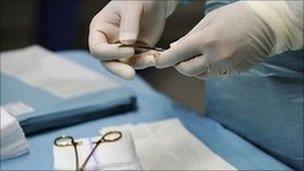Is private sector involvement with the NHS a good thing?
- Published

The Reverend Catherine Pickford's been coming to Elswick Health Centre in Newcastle for nine years.
These days she juggles running St James' Church in Benwell with family life, so she needs a surgery that fits in with her timetable.
She said: "It's a very friendly atmosphere - I like the staff on reception - and particularly this surgery I really like the way that it's set out."
But in 2012 a private company took over the surgery. It's still part of the NHS but run by a firm called Care UK.
Suzanne Lawrence, from Care UK, said: "We do make a profit that we return to the business to invest in more services.
"But the important thing on the issue of profit is that the NHS is a cash limited system and we have to take the resources that are available and spend those as widely as we can to give the best health care for patients.
"We've changed the opening hours to extend them and to run Saturday morning services as well - we've also made quite a lot of investment in terms of additional equipment."
Certainly there is a least one happy patient - Reverend Pickford.
She said: "Two weeks ago I had a persistent sore throat - and I managed to get an appointment straight away.
"That was a big improvement on my experience in the past which was that I could have been on the phone for half-an-hour or more still not managing to get through - and by the time I did there were no appointments left."
But it's not just Care UK working within the NHS in the North East and Cumbria.
'Profits for shareholders'
Virgin Care run sexual health services across Teesside and Specsavers run hearing clinics across Sunderland.
Some people working within the NHS are not convinced the private sector involvement is a good thing.
After years of training, Dr Leah McAleer resigned from her first job as a GP in Newcastle when Care UK took over.
She said: "The decision boiled down to the fact that I wouldn't want to work in a practice where I wouldn't want to be a patient.
"I wouldn't want to see the money that is allocated to my health care being diverted away into profits for shareholders and private providers."
But despite those concerns the role of the private sector in the NHS could grow.
The government has introduced a policy called Any Qualified Provider - it means in each area three NHS services must be put out to competition.
In the North Of Tyne area, adult hearing services are involved. In Cumbria, private firms can compete with the NHS to carry out MRI scans and the NHS on Teesside will allow competition for psychological services.
The NHS may win those contracts - and private sector firms are not allowed to compete on price - only quality, but Professor Bob Hudson, a health expert at Durham University is not convinced.
He said: "Once the public sector NHS loses out its very, very hard to get it back. You're then in the hands of private companies as to how they will make ends meet given, crudely, their prime responsibility is to their shareholders and not to patients.
"The NHS as things stand will never be the same again and I wonder if people want that."
There is more from all sides of the debate on the Sunday Politics this Sunday on BBC 1 at 11:00.
- Published1 November 2012